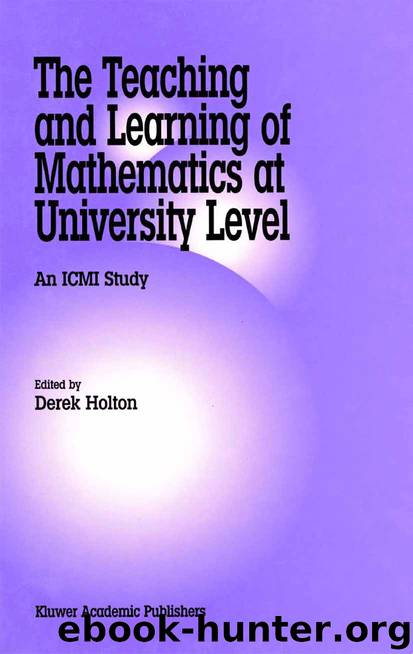The Teaching and Learning of Mathematics at University Level by Derek Holton

Author:Derek Holton
Language: eng
Format: epub
Publisher: Springer-Verlag Wien 2012
Published: 2015-02-18T16:00:00+00:00
5. APPLYING THE APOS THEORY
Research utilizing APOS theory has focussed on mathematical concepts such as: functions; various topics in abstract algebra including binary operations, groups, subgroups, cosets, normality and quotient groups; topics in discrete mathematics such as mathematical induction, permutations, symmetries, existential and universal quantifiers; topics in calculus including limits, the chain rule, graphical understanding of the derivative and infinite sequences of numbers; topics in statistics such as mean, standard deviation and the central limit theorem; elementary number theory topics such as place value in base n numbers, divisibility, multiples and conversion of numbers from one base to another; and fractions. In most of this work, the context for the studies are collegiate level mathematics topics and undergraduate students. In the case of the number theory studies, the researchers examine the understanding of pre-college mathematics concepts by college students preparing to be teachers. Finally, some studies such as that of fractions, show that APOS Theory, developed for ‘advanced’ mathematical thinking, is also a useful tool in studying younger students’ understanding of more basic mathematical concepts.
The totality of this body of work, much of it done by RUMEC members involved in developing the theory, but an increasing amount done by individual researchers having no connection with RUMEC or the construction of the theory, suggests that APOS Theory is a tool that can be used objectively to explain student difficulties with a broad range of mathematical concepts and to suggest ways that students can learn these concepts. APOS Theory can point us towards pedagogical strategies that lead to marked improvement in student learning of complex or abstract mathematical concepts and in students’ use of these concepts to prove theorems, provide examples, and solve problems. Data supporting this assertion can be found in the papers listed in the annotated bibliography (McDonald, 2000).
Download
This site does not store any files on its server. We only index and link to content provided by other sites. Please contact the content providers to delete copyright contents if any and email us, we'll remove relevant links or contents immediately.
The Art of Coaching Workbook by Elena Aguilar(51160)
Trainspotting by Irvine Welsh(21641)
Twilight of the Idols With the Antichrist and Ecce Homo by Friedrich Nietzsche(18621)
Fangirl by Rainbow Rowell(9228)
Periodization Training for Sports by Tudor Bompa(8253)
Change Your Questions, Change Your Life by Marilee Adams(7758)
This Is How You Lose Her by Junot Diaz(6877)
Asking the Right Questions: A Guide to Critical Thinking by M. Neil Browne & Stuart M. Keeley(5757)
Grit by Angela Duckworth(5604)
Red Sparrow by Jason Matthews(5465)
Paper Towns by Green John(5177)
Room 212 by Kate Stewart(5105)
Ken Follett - World without end by Ken Follett(4723)
Housekeeping by Marilynne Robinson(4436)
The Sports Rules Book by Human Kinetics(4379)
Papillon (English) by Henri Charrière(4262)
Double Down (Diary of a Wimpy Kid Book 11) by Jeff Kinney(4261)
The Motorcycle Diaries by Ernesto Che Guevara(4089)
Exercise Technique Manual for Resistance Training by National Strength & Conditioning Association(4061)
